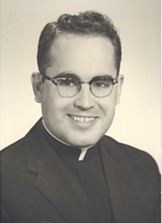
Ramon was born in Boise, Idaho in 1932 to Julio Echevarria and Antonia Arego. The oldest of three children, Ramon grew up in Boise, a thread of the city's closely-knit Basque community.
(Biographical information will be included upon receipt).
Drawing upon a lifetime of study and his firsthand experience as a priest, Ramon discusses the intimate relationship of Basques to the Catholic church. Looking back on centuries of history, he points to events and characteristics of Basques that help explain the ways in which Basques are both devoted to and conflicted about the Church.
TAPE MINUTE SUMMARY OF CONTENTS
0-8:00 Basque sentiment toward the Catholic Church is extremely varied, from those who love the church and everything it stands for to those who reject it. Ray’s parents told stories of a group of 4 or 5 older Basques who would go around to some of the sheepherding camps, telling the young sheepherders to stay away from Catholicism. They told the sheepherders that since the United States was a Protestant country, it would be easier for them to fit in if they rejected the Catholic Church. The majority of Basques who immigrated to the US stopped going to church regularly, attending only to take some of the necessary sacraments. Ray argues that this is no different from many Italian, Hispanic (except for Mexicans), and other predominantly Catholic immigrants. Removed from a culture where being part of the church was critical to being accepted within the community, and finding themselves in a culture where the Catholic priests were either Irish or from another culture, many Basques wandered away from the church. The sheepherders were isolated, making it difficult for them to go to church and adding to the influences that drew Basques away from the church. In addition, Ray points to the historical tendency of the Basques to be anticlerical and fiercely democratic. They fought any form of institutional hierarchy. The Catholic Church is full of this kind of hierarchy. Even the Basque clergy was historically opposed to the central power in Rome. Added to the mix were the leftovers from the Spanish Civil War and bitterness toward Franco. To this day, Basques are not opposed to the Catholic Church in and of itself, but rather to the hierarchical power structure it sustains.
8:00-14:00 Basques are, by nature, are extremely devoted people. Ray talks about their connection to nature. The Basques who came to the United States to work in sheepherding and other areas maintained their contemplative spirit. He suggests that there must be a substantial amount of unrecorded prayerfulness and spirituality, and feels that many men and women must have prayed and held fast to their connection to God while working out of doors. Many Basques were not educated very well in theology by the church, so when they came to the United States and were removed from their previous environments, they did not have much knowledge with which to build a new Catholic community. Ray gives the example of his father.
14:00-30:00 Ray draws a distinction between American-Basque families and Basque family in the Basque country. He says that the families here are tied to the church much more strongly than those in the old country. Young people in the Basque country are leaving the church in droves, rejecting much of what it has to teach. Priests in the Basque country are alarmed that the enrollment in seminaries has dropped sharply over the past years. He gives his thoughts on the reasons behind this drop, and draws a connection between sheepherding and becoming a priest. He makes some predictions for the future of the Catholic Church and the priesthood especially in poor, developing countries. There is a great deal of pressure within the church to do away with as much of the hierarchy as possible, to open the church and democratize it. He sees a turnaround for the church in the future, a decrease in the clerical part of it.
Side 2
0-10:30 Ray gives a brief history of the early Catholic Church, and supports the need for the church as an institution. He talks about his own spirituality and his views on hierarchy within the church. He remembers his years as a priest. He left the priesthood because of his views on the fallacy of hierarchy and his dislike of clericalism. Ray values his experience as a Basque in Boise, saying that it gave him the strength and self-confidence to leave the priesthood, and instills within him a deep sense of spirituality.
NAMES AND PLACES
NAMES:
Francisco Franco – Spanish dictator.
PLACES:
Boise, Idaho – Ramon was born and raised in Boise.
THEMES:
Immigration
Relationship between Basques and the Catholic Church
Religion
Theology